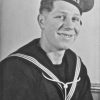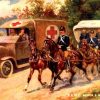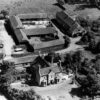7. Muston, the Methodists and The Parish Register
Crabbe 1805 - 1807
By Kate Pugh
Mr. Crabbe a Jacobin!
In Late August Crabbe returned to his parish. Local legend has it that the villagers threw dung at his carriage as it passed on its way to the rectory. During Crabbe’s long absence their souls had been in the care of a succession of curates, none of whom had stayed long. Crabbe’s son refers to a strange rumour that had reached Muston from Suffolk that ‘Mr. Crabbe was a Jacobin’, ‘which disinclined the hearts of many of the country people there to receive him … first …there were few to believe the story -“it must be a loy (lie), for the rector had always been a good, kind gentleman, and much noticed by the Duke…” at length it gained a pretty general credence.‘ Crabbe’s son attributes this strange idea of his father’s politics to his father’s openly expressed opinion that war might have been avoided, a position much resented amongst a ‘purely agricultural’ population connecting ‘everything that was praiseworthy with the maintenance of the war that, undoubtedly, had raised agricultural prices to an unprecedented scale‘…Like Wordsworth and others, Crabbe was ‘one of the innumerable good men, who, indeed, hailed the beginning of the French Revolution, but who execrated its close.'(1) It is possible that the idea arose from his association with the Cartwright family. John Cartwright of Boston, brother to Crabbe’s friend Edmund, was a noted reformer, an associate of William Cobbett, an advocate of universal manhood suffrage and the secret ballot and an opponent of the war with France.
In addition to this embarrassment Crabbe was dismayed on his return to find that a substantial proportion of his congregation had defected to the Methodists and he only alienated his parishioners more by preaching against the dissenters. Even worse, a disciple of Huntington was spreading ‘the pernicious fanaticism of his own half-crazy master’ and two of Crabbe’s servants had enlisted amongst his followers. ‘The man, a conceited ploughman, set up for a Huntingtonian preacher himself; and the woman, whose moral character had been sadly deteriorated since her adoption of the new lights, was at last obliged to be dismissed, in consequence of intolerable insolence.'(2) Unfortunately the views of the ‘conceited ploughman’ and the intolerably ‘insolent’ female servant on these events are not known. John Clare’s reaction to Crabbe, that ‘he writes about the peasantry as much like the magistrate as the poet – he is determined to show you their worst side’, seems understandable in the light of comments like these, though it is not an entirely fair assessment of his poetry. (3)
In his youth Crabbe had admired Wesley and even introduced himself to him in Lowestoft, now, however, he attacked the Huntingtonians ferociously and described Methodism as ‘spiritual influenza.’ Far from exhibiting ‘Jacobin’ tendencies, he showed every sign of turning into a reactionary country parson. Crabbe’s son claims that his father ‘never allowed political affairs to occupy his mind‘, but suggests that it is natural for ‘every young man who is conscious of powers and capabilities above his station’ to ‘adopt … popular or liberal opinions. He particularly feels the disadvantages of his own class…’ Crabbe’s attitudes seem to have been as much a product of personal loyalties and allegiances as theological or ideological positions. As his son remarks, ‘when he felt the full advantages of his rise … the aristocratic and Tory leanings he then showed were rather the effect of these circumstances…'(4)
Whatever popular opinions he may have held in his earlier days, Crabbe had little sympathy now with dissenting groups. While both Wesley and Huntington described themselves as Tories, for their followers ‘the establishment of a chapel was an act of defiance against parson and squire.‘ (5) Crabbe seems to have regarded it as a personal affront. Methodism was strong in the Vale. The Grantham Methodist chapel had been established in the 1750s. Possibly Crabbe’s resentment against the Methodists was fueled by the knowledge that Tom Paine, his personal ‘bogeyman’ and enemy of his patron Burke, had preached there while serving as an excise officer. The Muston Methodist chapel was built in 1802. Huntingtonian chapels were built in Grantham and Newark in 1806.
The Parish Register
In spite of these disappointments, by September 1807 Crabbe had completed and published ‘The Parish Register’ in Poems 1807. .It was, says Neil Powell, ‘one of the most spectacularly successful relaunches in the history of English literature.’ The narrator of the poem is a country parson recalling, as he looks through the register, the people and events of the year :
‘The year revolves, and I again explore
The simple annals of my parish poor;’
The characters and lives described in the poem are based on village people encountered in the various parishes where he had lived, both in Suffolk, where he began the poem and the Vale of Belvoir, where he finished it. When asked if his creations were based on real people, Crabbe himself replied, ‘I endeavoured to paint as nearly as I could and dare for in some cases I dared not … besides, Charity bade me be cautious … There is not one of whom I had not in my mind the original, but I was obliged in most cases to take them from their real situations, in one or two cases to change even the sex, and in many the circumstances…’ (6)
Peter Pratt
The attempts of the Reverend J.H. Evans, Vicar of Croxton Kerrial and Rector of Branston-by-Belvoir, to match Crabbe’s characters with the inhabitants of the Vale of Belvoir are not always convincing, but some of his correspondences are plausible.
Evans claims that ‘The poet was assisted often by an equally enthusiastic, though loquacious and pedantic, gardener’ who ‘liked … being with his master … so as to listen to his talk. Then would come opportunities for enlightenment by giving him botanical explanations.'(7) Whether a real inhabitant of Muston or not, this gardener gives Crabbe an opportunity to parody Erasmus Darwin, the physician and botanist from nearby Elston, who wrote a long poem entitled The Botanical Garden:
‘Not Darwin’s self had more delight to sing
Of floral courtship in th’awakened Spring
Than Peter Pratt, who, simpering, loves to tell
How rise the Stamens, as the Pistils swell.’
Peter Pratt gives all his children botanical names:
‘Why Lonicera wilt thou name thy child?’
I asked the gardener’s wife, in accents mild:
‘We have a right,’ replied the sturdy dame,
And Lonicera was the infant’s name.’
And is old Dibble dead?
Powell agrees with Evans that Dibble, the sexton, in the final section of The Parish Register, is Muston’s parish clerk. (8)
‘His eightieth year he reach’d, still undecay’d
And rectors five to one close vault convey’d.’
The rectors Dibble remembers are Crabbe’s predecessors; ‘good master Addle’ is Samuel North, rector from 1738 to 1758:
‘His stride majestic and his frown severe…’ who was apparently in the habit of dropping off to sleep during services, until one Sunday he did not wake up:
‘Th’expecting people view’d their slumbering priest:
Who, dozing, died.’
He is buried in the chancel of St John the Baptist.
‘Parson Peele’ is Francis Bacon, rector from 1758 to 1768, fond of ‘piercing jokes’, who appears to have regarded his living as a business, probably increasing its value through enclosure and improving the farming of the glebe :
“I will not spare you,” was his favourite text:
Nor did he spare, but raised them many a pound:
E’en me he mulct for my poor rood of ground…’
He was followed by his son, ‘Dr Grandspear’, Francis Bacon D.D., Master of the King’s School, Grantham, who ‘wore a world of hat’ and seems to have been a more generous man than his father:
‘…to all, he was polite and free
Kind to the poor, and, ah! most kind to me:
“Ralph,” he would say, “Ralph Dibble, thou art old;
That doublet fit, ’twill keep thee from the cold;
How does my sexton? – What! the times are hard:
Drive that stout pig, and pen him in thy yard.”
Next comes Crabbe’s self-portrait. He presents himself as unwordly, indifferent to social status, absent minded and absorbed in his studies:
‘Then came the Author-Rector: his delight
Was all in books; to read them or to write;
Courteous enough, but careless what he said,
For points of learning he reserved his head;
And when addressing either poor or rich,
He knew no better than his cassock which…’
One character in The Parish Register is definitely from Muston. Robin Dingley, is referred to in a footnote in the 1834 edition of Poems: ‘Robin Dingley, the wandering pauper, was suggested by Richard Wilkinson, a parishioner of Muston, who every now and then disappeared, like some migratory birds, no one could conjecture whither, and, just as his existence was forgotten, home came Richard to be again clothed and fed at the expense of the parish’
The Reverend Evans failed to find any convincing reference to Wilkinson in the Muston parish register, but he is almost certainly the Wilkisson, or Wilkinson referred to in the Overseers of the Poor book for 1784. (See Victim of a Vile Attorney.)
The Muston Parish Register does, however, offer a glimpse of the sort of experience that informed Crabbe’s poetry. In 1806, while he was finishing The Parish Register, he was riding back from the neighbouring parish of Sedgebrook when he met a vagrant with a baby which he baptized then and there under the hedgerow. Presumably the baby seemed unlikely to live long enough to reach the mother’s parish of settlement, Market Harborough, thirty miles away.
A vagrant with a baby would not have been welcome in Sedgebrook or Muston.
References
(1) Life pp 165-166
(2) ibid p. 174
(3) Bate
(4) Life pp 167-168
(5) Keane
(6) Letters, Letter to Mary Leadbeater, Ist. Dec. 1816.
(7) Evans
(8) Powell pp 174-175





















Comments about this page
My GGG Grandfather is Danel Leighton, born 1803 in Muston. In the late 1880s T.E.Kebbel came to Muston, researching for his book, “The Life of George Crabbe”. He found Daniel, who remembered Crabbe, and Daniel’s reminiscences were published in the book. An extract follows:
At Muston ” the oldest inhabitant ” is a labourer, named Daniel Leighton, an old gentleman bent nearly double, but in other respects hale and vigorous. He is eighty-six years of age, and would have been twelve years old when the poet left Muston. But he remembered “Muster Crabbe.” Being asked what he was like, he replied, ” Oh, a little stiff man ;” and that was all that could be got out of him as regarded Crabbe’s personal appearance. He said that he had gone out beating the bounds with Mr. Crabbe, and that when they came to the boundary stones, instead of some unfortunate boy being bumped against them to make him remember the spot, Crabbe distributed nuts and oranges among the school children, as likely to produce the same effect by more benevolent means. He likewise told me of a curious trait of old-fashioned manners which he remembered to have witnessed. He showed me the spot at the bottom of what was Crabbe’s garden, where a bathing-house formerly stood; to which he had often seen ” the ladies of the family ” — ” real ladies,” he took care to tell us—come down to bathe in the tiny brook which is not, at this place, much more than a yard in width.
Thank you vey much for this delightful addition.It’s good to know that some of Crabbe’s parishioners had kindly memories of him. I must try to find T.E. Kebbel’s book. I have always, rather lazily, assumed that Crabbe’s rectory was in the grounds of the present rectory, but I must have a closer look at the map to see where the bathing-house may have been.
Add a comment about this page